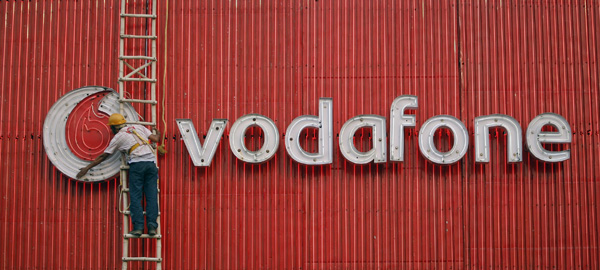
A worker replaces fluorescent lights on a Vodafone billboard in New Delhi June 20, 2011. (Photo: Parivartan Sharma / Reuters)
At a dinner with reporters last night in New Delhi, Andy Halford, the chief financial officer of Vodafone, the British mobile phone giant, said that Vodafone “could potentially get an annual dividend of as much as $5.5 billion from its 45 percent stake in U.S. venture Verizon Wireless.” Here’s the Bloomberg story, which sent the stock up overnight. If Halford’s expectations come to pass, that will be a bit of vindication for him; he says there has been a healthy amount of internal debate at Vodafone about the wisdom of holding on to the investment, which for years paid no dividend at all.
The rest of Halford’s comments may not move the markets, but in the longer term they were just as interesting. Vodafone is involved in one of the most significant, and unusual tax cases ever to come before an Indian court. The Indian government wants Vodafone to pay more than $2 billion in capital gains taxes for the deal they used to enter the Indian market. Here’s the explanation in the Financial Times, which has been following the case carefully:
“Vodafone bought a 67 per cent stake in Hutchison Essar, now known as Vodafone Essar, from Hutchison of Hong Kong in 2007. The transaction was made via a Dutch company controlled by Vodafone that paid $11bn to a Cayman Islands entity run by Hutchison Whampoa, the seller, for another Cayman Islands group that indirectly held a controlling stake in the India-based mobile operator.”
It’s the kind of offshore tax-minimizing that taxpayers and politicians love to hate but corporations use all the time — Hutchison and Vodafone conducted this transaction in the Cayman Islands, ensuring that neither the buyer nor the seller would be subject to tax. Vodafone’s position is that it followed Indian law to the letter and owes no tax to anyone. The Indian tax authorities say, no so fast, you can’t buy a company whose operating assets are entirely in India without paying any tax to the Indian government.
Last September, Vodafone lost a case in the Mumbai High Court, and has appealed to the Supreme Court, which will hear the case on July 19. The outcome could affect other big M&A deals in India. In 2004, for example, GE sold its 60% stake in an Indian outsourcing company, Genpact. India’s tax authorities are pursuing the Vodafone case so vigorously that they have already started penalty proceedings, which could raise the bill to as much as $5 billion.
An uncertain (Vodafone might say arbitrary) tax regime isn’t the only challenge. The biggest story in the telecoms right now is, of course, the massive scandal over allocation of wireless spectrum, which has already landed the former telecom minister in jail. He’s accused of improperly favoring some bidders and underpricing the spectrum, resulting in a loss of as much as $40 billion in revenue to the Indian government. Halford diplomatically called India “low on the list in regulatory clarity” compared to other countries.
And yet, despite it all, Halford says the company is committed to staying in India, soon to be the world’s largest mobile phone market. “It could slow us down,” he says, by tying up cash that it could otherwise invest in expanding in the Indian market, but leaving India, where it is already a strong No. 2, isn’t on the table. In fact, Vodafone is doubling down on India while folding on China. In India, unlike in China, Vodafone has some control, even amid all the uncertainty. It recently sold its tiny stake in China Mobile for $6.65 billion out of frustration.
Updated July 4, 2011.

